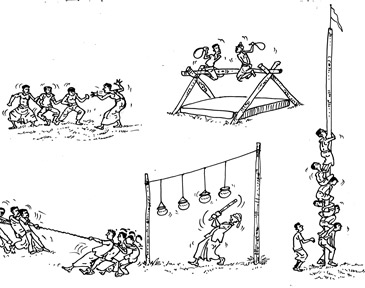Festive spirit in the air
by Nadira GUNATILLEKE
The New year is here again. Rural folk call it Hingala Avurudda or
Bak Maha Ulela. Ordinary people call it Sinhala Avurudda or Aluth
Avurudda. Some scholars and politicians who had wanted to establish
ethnic harmony named it 'Sinhala and Tamil New Year' or 'Sinhala and
Hindu New Year'. Anyway, however it may be called, the New Year has come
again, bringing happiness to children, stress to parents and sales for
traders.
 This time the New Year is real. After three decades, Sri Lankans
would celebrate the event without and fear or suffering. Earlier, during
New Year shoppers were more concerned about bombs than the goods
available in the market. This time the New Year is real. After three decades, Sri Lankans
would celebrate the event without and fear or suffering. Earlier, during
New Year shoppers were more concerned about bombs than the goods
available in the market.
This new year is significant because shoppers only need to be
concerned about what they are going to buy. They need not worry about
unidentified parcels and sudden explosions. Children, wives and parents
are assured of the safe return of their father, husband or son who is
serving in the Armed Forces. The family is all united for the New Year
celebration because there are no bombs and bullets to snatch members
away without prior notice.
What is the real meaning of New Year? Every year on April (Bak) 13
and 14, Sinhala Buddhists and Tamil Hindus celebrate this festival which
is based on the Sun, the energy provider in the cosmos entering the
house of Aries (Mesha Rashi), the first sign of the Zodiac from the
house of Pisces (Meena Rashi) the last sign.
Regardless whether you believe astrology or not, you can relax and
enjoy yourself during this season. In this busy day and age, spending
time with your family at home even for a few days is a luxury in itself.
There are many rituals and customs associated with this celebration.
All of them mainly characterise prosperity, cultivation of goodwill in
society, cooperation, harmony and family reunion. Each and every custom
such as 'Weda Ath Hareema' (stopping work), Weda Alleema (starting
work), Lipa Gini Melaweema (lighting the hearth), Ahara Piseema
(cooking), Ahara Anubhavaya (partaking of meals), Ganu Denu Kireema
(transactions) and Hisa Thel Gama (anointing oil) bear deep meanings
such as laying the foundation to prosperity, a new beginning for
everything, bringing freshness to the whole house including its
occupants, cultivating unity in society and promoting healthy behaviour.
But the question is, how many of us know the real meaning of these
customs?
All family members get together during the New Year season and visit
their relations and friends. They especially visit the Maha Gedera, the
ancestral home. This helps build harmony and unity. Traditional games
and activities such as the rope-swing, reciting Varam, playing raban,
chakgudu, pancha keliya and pillow fights provide a lot of fun and
ecstasy to the participants and the spectators, while also building
harmony in society.
Hisa Thel Gama (anointing of oil plays a significant role in ensuring
good health. The Nanu (herbal oil) is made by mixing several herbal
medicines and provides numerous positive effects to those being
anointed. This custom also conveys blessings to the person who receives
the oil treatment. Auspicious times set by astrologers play a
significant role in this cultural event.
But today, the real meaning and the spirit of celebrating this
valuable cultural festival is gradually vanishing. Commercialisation of
society life and social values is the main cause for this situation.
Although the children look forward to this season with joy in their
hearts, parents are worried about the money that they will need to buy
food, gifts, suits and other requirements. This is mainly due to the
mismanagement of their income. Traders are busy selling rubbish to these
innocent and gullible people who want to buy anything and everything
they see.
They take more than a month to realise their mistakes, but it is too
late then, because they cannot re-sell what they have already bought to
get their money back to re-pay the loans they have taken. Mismanagement
of income creates a lot of problems in the family, including family
disputes. Some of those disputes even lead to violence and could even
end in hospitalisation or death! Thus one mistake (mismanagement of
money) can destroy the happiness of the season of an entire family.
Innocent children may also fall victim to such things.
Most historic customs and traditional games are facing the threat of
vanishing without a trace except for one traditional game. In a way, it
is natural because today, it seems, everything depends on money. But
human life will not survive without morals and social ethics. In the
past, such things had survived because of the sprit of cultural events
such as New Year customs.
One traditional game, however has survived despite all
transformations and will continue to thrive in this commercialised
society. Guess what it is? It is the Kamba Adeema (tug-of-war)!
|

